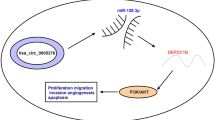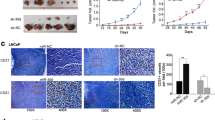Abstract
We previously demonstrated that microRNA (miR)-224 expression was significantly reduced in human prostate cancer (PCa) tissues and predicted unfavorable prognosis in patients. However, the underlying mechanisms of miR-224 have not been fully elucidated. In this study, calcium/calmodulin-dependent protein kinase kinase 2 (CAMKK2) was identified as a target gene of miR-224. Then, we found that enforced expression of miR-224 could suppress PCa cell proliferation and cell cycle by regulating the expression of CAMKK2 in vitro. In addition, the expression levels of miR-224 in PCa tissues were negatively correlated with those of CAMKK2 mRNA significantly (Spearman’s correlation: r = −0.66, P = 0.004). Moreover, combined low miR-224 expression and high CAMKK2 expression (miR-224-low/CAMKK2-high) was closely correlated with advanced clinical stage (P = 0.028). Furthermore, PCa patients with miR-224-low/CAMKK2-high expression more frequently had shorter overall survival than those in groups with other expression patterns of two molecules. In conclusion, our data offer the convincing evidence that miR-224 and its target gene CAMKK2 may synergistically contribute to the malignant progression of PCa. Combined detection of miR-224 and CAMKK2 expressions represents an efficient predictor of patient prognosis and may be a novel marker which can provide additional prognostic information in PCa.




Similar content being viewed by others
References
Siegel R, Naishadham D, Jemal A. Cancer statistics, 2013. CA Cancer J Clin. 2013;63:11–30.
Ferlay J, Parkin DM, Steliarova-Foucher E. Estimates of cancer incidence and mortality in Europe in 2008. Eur J Cancer. 2010;46:765–81.
Molitierno J, Evans A, Mohler JL, Wallen E, Moore D, Pruthi RS. Characterization of biochemical recurrence after radical prostatectomy. Urol Int. 2006;77:130–4.
Klotz L. Hormone therapy for patients with prostate carcinoma. Cancer. 2000;88:3009–14.
Eisenberger MA, Blumenstein BA, Crawford ED. Bilateral orchiectomy with or without flutamide for metastatic prostate cancer. N Engl J Med. 1998;339:1036–42.
Bartel DP. MicroRNAs: genomics, biogenesis, mechanism, and function. Cell. 2004;116:281–97.
Bentwich I, Avniel A, Karov Y, Aharonov R, Gilad S, Barad O. Identification of hundreds of conserved and nonconserved human microRNAs. Nat Genet. 2005;37:766–70.
Chou J, Shahi P, Werb Z. MicroRNA-mediated regulation of the tumor microenvironment. Cell Cycle. 2013;12:3262–71.
Calin GA, Liu CG, Sevignani C, Ferracin M, Felli N, Dumitru CD, et al. MicroRNA profiling reveals distinct signatures in B cell chronic lymphocytic leukemias. Proc Natl Acad Sci U S A. 2004;101:11755–60.
Porkka KP, Pfeiffer MJ, Waltering KK, Vessella RL, Tammela TL, Visakorpi T. MicroRNA expression profiling in prostate cancer. Cancer Res. 2007;67:6130–5.
Iorio MV, Croce CM. MicroRNAs in cancer: small molecules with a huge impact. J Clin Oncol. 2009;27:5848–56.
He HC, Han ZD, Dai QS, Ling XH, Fu X, Lin ZY, et al. Global analysis of the differentially expressed miRNAs of prostate cancer in Chinese patients. BMC Genomics. 2013;14:757.
Lin ZY, Huang YQ, Zhang YQ, Han ZD, He HC, Ling XH, et al. MicroRNA-224 inhibits progression of human prostate cancer by downregulating TRIB1. Int J Cancer. 2014;135:541–50.
Taylor BS, Schultz N, Hieronymus H, Gopalan A, Xiao Y, Carver BS, et al. Integrative genomic profiling of human prostate cancer. Cancer Cell. 2010;18:11–22.
Dweep H, Sticht C, Pandey P, Gretz N. miRWalk--database: prediction of possible miRNA binding sites by “walking” the genes of three genomes. J Biomed Inform. 2011;44:839–47.
Betel D, Koppal A, Agius P, Sander C, Leslie C. mirSVR predicted target site scoring method: comprehensive modeling of microRNA targets predicts functional non-conserved and non-canonical sites. Genome Biol. 2010;11:R90.
Cary RL, Waddell S, Racioppi L, Long F, Novack DV, Voor MJ, et al. Inhibition of Ca2+/calmodulin-dependent protein kinase kinase 2 stimulates osteoblast formation and inhibits osteoclast differentiation. J Bone Miner Res. 2013;28:1599–610.
Mairet-Coello G, Courchet J, Pieraut S, Courchet V, Maximov A, Polleux F. The CAMKK2-AMPK kinase pathway mediates the synaptotoxic effects of Aβ oligomers hrough Tau phosphorylation. Neuron. 2013;78:94–108.
Racioppi L, Means AR. Calcium/calmodulin-dependent protein kinase kinase 2: roles in signaling and pathophysiology. J Biol Chem. 2012;287:31658–65.
Racioppi L, Noeldner PK, Lin F, Arvai S, Means AR. Calcium/calmodulin-dependent protein kinase kinase 2 regulates macrophage-mediated inflammatory responses. J Biol Chem. 2012;287:11579–91.
Racioppi L. CaMKK2: a novel target for shaping the androgen-regulated tumor ecosystem. Trends Mol Med. 2013;19:83–8.
Itkonen HM, Mills IG. N-linked glycosylation supports cross-talk between receptor tyrosine kinases and androgen receptor. PLoS One. 2013;8:e65016.
Frigo DE, Howe MK, Wittmann BM, Brunner AM, Cushman I, Wang Q, et al. CaM kinase kinase beta-mediated activation of the growth regulatory kinase AMPK is required for androgen-dependent migration of prostate cancer cells. Cancer Res. 2011;71:528–37.
Massie CE, Lynch A, Ramos-Montoya A, Boren J, Stark R, Fazli L, et al. The androgen receptor fuels prostate cancer by regulating central metabolism and biosynthesis. EMBO J. 2011;30:2719–33.
Karacosta LG, Foster BA, Azabdaftari G, Feliciano DM, Edelman AM. A regulatory feedback loop between Ca2+/calmodulin-dependent protein kinase kinase 2 (CaMKK2) and the androgen receptor in prostate cancer progression. J Biol Chem. 2012;287:24832–43.
Shima T, Mizokami A, Miyagi T, Kawai K, Izumi K, Kumaki M, et al. Down-regulation of calcium/calmodulin-dependent protein kinase kinase 2 by androgen deprivation induces castration-resistant prostate cancer. Prostate. 2012;72:1789–801.
Acknowledgments
This work was supported by grants from National Natural Science Foundation of China (81170699, 81272813, 81200550), Science and Technology Project of Guangdong Province (2012B031800008), Guangzhou Municipal Science and Technology Key Project (11C23150711), Projects of Guangdong Key Laboratory of Clinical Molecular Medicine and Diagnostics.
Conflicts of interest
None
Author information
Authors and Affiliations
Corresponding author
Additional information
Hao FU, Hui-chan He, and Zhao-dong Han contributed equally to this article.
Electronic supplementary material
Below is the link to the electronic supplementary material.
Supplement Fig. 1
Original data of transwell and wound-healing assay. Overexpression of miR-224 fail to promote invasion and migration in CAMKK2 knockdown DU145 cells. (GIF 660 kb)
Rights and permissions
About this article
Cite this article
FU, H., He, Hc., Han, Zd. et al. MicroRNA-224 and its target CAMKK2 synergistically influence tumor progression and patient prognosis in prostate cancer. Tumor Biol. 36, 1983–1991 (2015). https://doi.org/10.1007/s13277-014-2805-0
Received:
Accepted:
Published:
Issue Date:
DOI: https://doi.org/10.1007/s13277-014-2805-0




